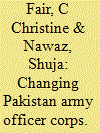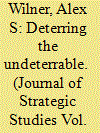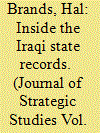| Srl | Item |
| 1 |
ID:
102366


|
|
|
|
|
| Publication |
2011.
|
| Summary/Abstract |
The Pakistan Army elicits many concerns about terrorism, nuclear and the coherence of the state. However, very little is actually known about this institution. This article mobilizes unique data to address one important facet: the Army's geographical recruitment base. We find that the Pakistan Army has been successful at expanding the geographical recruitment base while some groups (namely those who are native to Sindh) remain highly under-represented. We also find that the officer corps is increasingly coming from urban areas. We conclude with a discussion of the implications of these important shifts subject to the limitations of our data.
|
|
|
|
|
|
|
|
|
|
|
|
|
|
|
|
| 2 |
ID:
102370


|
|
|
|
|
| Publication |
2011.
|
| Summary/Abstract |
This article argues that deterrence theory can be applied to counterterrorism. Doing so requires broadening the traditional concept of deterrence by punishment, expanding deterrence by denial to include defense, mitigation, and strategic hindrance, and developing deterrence by delegitimization to influence the political, ideological, and religious rationales informing terrorist behavior. In practice, deterring terrorism requires tailoring threats against state and individual facilitators, diffusing the intended consequences of terrorism, and manipulating terrorist self-restraints. When these and other deterrent leverages are applied simultaneously against various actors and processes involved in terrorism, coercion can be achieved.
|
|
|
|
|
|
|
|
|
|
|
|
|
|
|
|
| 3 |
ID:
102367


|
|
|
|
|
| Publication |
2011.
|
| Summary/Abstract |
This article uses captured Iraqi state records to examine Saddam Hussein's reaction to US arms to sales to Iran during the Iran-Iraq War (the Iran/Contra scandal). These records show that 'Irangate' marked a decisive departure in Saddam's relations with the United States. Irangate reinforced Saddam's preexisting suspicions of US policy, convincing him that Washington was a strategic enemy that could not be trusted. Saddam concealed his anger to preserve a working relationship with the Reagan administration, but this episode nevertheless cemented his negative views of the United States and forged a legacy of hostility and mistrust that would inform his strategic calculus for years to come.
|
|
|
|
|
|
|
|
|
|
|
|
|
|
|
|
| 4 |
ID:
102363


|
|
|
|
|
| Publication |
2011.
|
| Summary/Abstract |
Conventional wisdom on the phenomenon of war is criticised for providing little relevant guidance to deal with the security challenges of our era. One reason is that this attitude uncritically assumes power as synonymous with force. In response, 'productive war' is here proposed as a re-conceptualisation of war based on Michel Foucault's alternative understanding of power. Productive war appreciates the role of violence but subordinates it to non-kinetic dynamics influencing the dimension of meaning in international security. This theoretical perspective provides a conceptual framework to deal with the dynamics of political mobilisation essential to create public support for nation-building abroad and for visions of world order.
|
|
|
|
|
|
|
|
|
|
|
|
|
|
|
|
| 5 |
ID:
102369


|
|
|
|
|
| Publication |
2011.
|
| Summary/Abstract |
As the January 1968 Tet holiday approached, CIA analysts and American commanders in South Vietnam developed more accurate conclusions about communist military strategy than did intelligence analysts at CIA headquarters. Besides valuing different types of intelligence, General William Westmoreland, Lieutenant General Frederick Weyand, and CIA analysts in Saigon also placed greater emphasis on new information about communist military strategy than did CIA analysts at Langley. These different reactions to information highlight reasons why military commanders and intelligence analysts stationed in the theater of operations might develop more accurate conclusions about enemy military strategy than intelligence analysts stationed at their national headquarters.
|
|
|
|
|
|
|
|
|
|
|
|
|
|
|
|